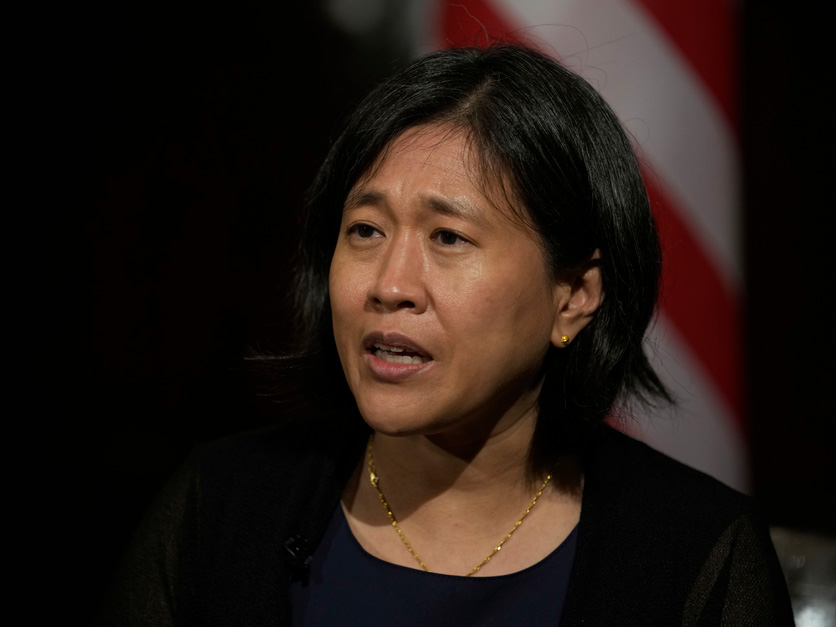U.S. Trade Representative Katherine Tai on Tuesday forcefully defended President Joe Biden's cautious approach to negotiating new trade agreements, saying the administration wants to avoid deals that pit one U.S. sector against another.
Even so, she insisted at a House Ways and Means hearing that the administration is doing all it can to remove key barriers to U.S. farm products, including a Mexican ban on biotech corn.
Republicans on the committee criticized Tai for not pursuing new tariff-reducing trade agreements.
Farmers “often refer to America as the world's breadbasket. But lately, they feel more like the world's cash cow,” committee Chairman Jason Smith, R-Mo., told Tai, citing the growing U.S. ag trade deficit, which is projected to reach a record $30.5 billion for fiscal 2024, up from $16.6 billion in FY23.
“U.S. agriculture producers benefit when the administration aggressively pursues the trade agenda that prioritizes their interests. And when USTR goes to bat for them around the world, USTR must be far more aggressive in protecting the interests of American farmers,” Smith said.
Smith specifically cited Thailand’s 50% tariff on beef and Kenya’s 27% tariff on U.S. agricultural products as barriers the administration wasn’t addressing.
Smith also said the administration had failed to force China to honor its commitments in the Phase One deal in late 2019 in which China agreed to ramp up purchases of U.S. agricultural products.
Tai stressed in response to Republican committee members that the Biden administration wanted to make sure that new trade agreements don't punish some sectors to benefit others.
“We are taking a different approach, and our approach is built on the basic principle that we should not be pitting Americans against Americans, and American sectors against American sectors,” Tai told the committee.
In a subtle suggestion that Biden’s approach wasn’t a major shift from her Republican predecessor, she noted that the U.S.-Mexico-Canada agreement, which was negotiated under the Trump administration, “was built on a renegotiation of an existing agreement.” Donald Trump’s USTR, Robert Lighthizer, shares Tai’s concerns about the mixed benefits of tariff-reducing trade agreements.
When Rep. Vern Buchanan, R-Fla., pressed Tai on long-standing complaints by Florida tomato growers about the competition from lower-priced, imported Mexican tomatoes, Tai responded that those concerns show how a trade agreement, in this case the USMCA, can benefit some sectors over others.
“This is a great example within a sector, where a trade agreement is operating in different ways for different parts of the sector,” Tai said.
Still, she told Buchanan the administration was close to naming an advisory committee for the Florida growers that will “give them more voice and influence in the development of our trade policies that affect them.”
Tai also noted during the hearing that the U.S. ran a small deficit in agricultural trade during some years of the Trump administration. Those deficits of $1.3 billion in fiscal 2019 and $3.7 billion in FY20 turned into small surpluses in FY21 and FY22.
It’s easy to be “in the know” about what’s happening in Washington, D.C. Sign up for a FREE month of Agri-Pulse news! Simply click here.
She defended the administration's efforts to address barriers to ag products, including Mexico’s attempt to block imports of genetically engineered corn. A three-member USMCA panel has been assigned to rule on the Biden administration’s complaint against Mexico.
Rep. Adrian Smith, R-Neb., asserted that Biden has said nothing about the issue. That silence “would leave most reasonable people to believe that’s not a priority, that it doesn’t matter. … I’m concerned about rules-base Rep. Jason Smith, R-Mo. (AP Photo/Stephanie Scarbrough)d trade and the perception that Mexico is getting a pass on this,” he said.
Rep. Jason Smith, R-Mo. (AP Photo/Stephanie Scarbrough)d trade and the perception that Mexico is getting a pass on this,” he said.
Tai said the administration was “actively pursuing litigation” against the ban, a reference to the USMCA case, and described the Mexican policy as an “illegitimate and unscientifically based restriction” on trade.
She also said the administration was continuing to push Brazil to reduce its 18% tariff on U.S. ethanol. She noted that USTR’s chief ag trade negotiator, Doug McKalip, had recently discussed the issue with Brazil’s agriculture ministry.
“They understand how important this issue is to us,” Tai said of the Brazilians. “We are working to find ways to relieve the tensions in this part of our relationship.”
Tai also was pressed during the hearing to issue a required report on the impact of tariffs that then-President Donald Trump imposed on China in 2018 using Section 301 authority. By law, Section 301 tariffs must be reviewed every four years. “Maybe it's time for the Biden administration to just admit that he did something right,” Smith told Tai, referring to Trump. Biden has left the tariffs in place.
Tai said USTR was “very close” to wrapping up its review, which started in September 2022. She said the review was a “whole of government effort” and a “tremendously consequential exercise in examining the use of tariff tools in addressing the inequities in the U.S.-China trade relationship, which are significant.”
On Wednesday, the Ways and Means Committee will take more steps to apply pressure on trade policy.
The panel is set to move a bill reauthoring the Generalized System of Preferences, a trade program that allows eligible developing countries to ship goods to the United States duty-free. Authority for the program expired at the end of 2020 and hasn't been renewed.
Smith said the GSP bill would include labor standards pulled from the USMCA, but Democrats complained that tougher environmental standards wouldn’t be included.
Tai said the White House supported reauthorization of GSP but added that the legislation should “address human rights, corruption, labor and environmental standards.”
The top five countries shipping to the United States under the GSP have been Thailand, Indonesia, Brazil, Cambodia and the Philippines, according to the Congressional Research Service.
The committee also will consider a bill to tighten the “de minimis” provision in trade law that has allowed imports of some goods to enter tariff-free. Imports from China under the provision have increased since 2018.
The bill would “make sure that countries like China can no longer use trade tools like de minimis to escape tariffs they rightfully owe,” Smith said.
For more news, go to Agri-Pulse.com.


